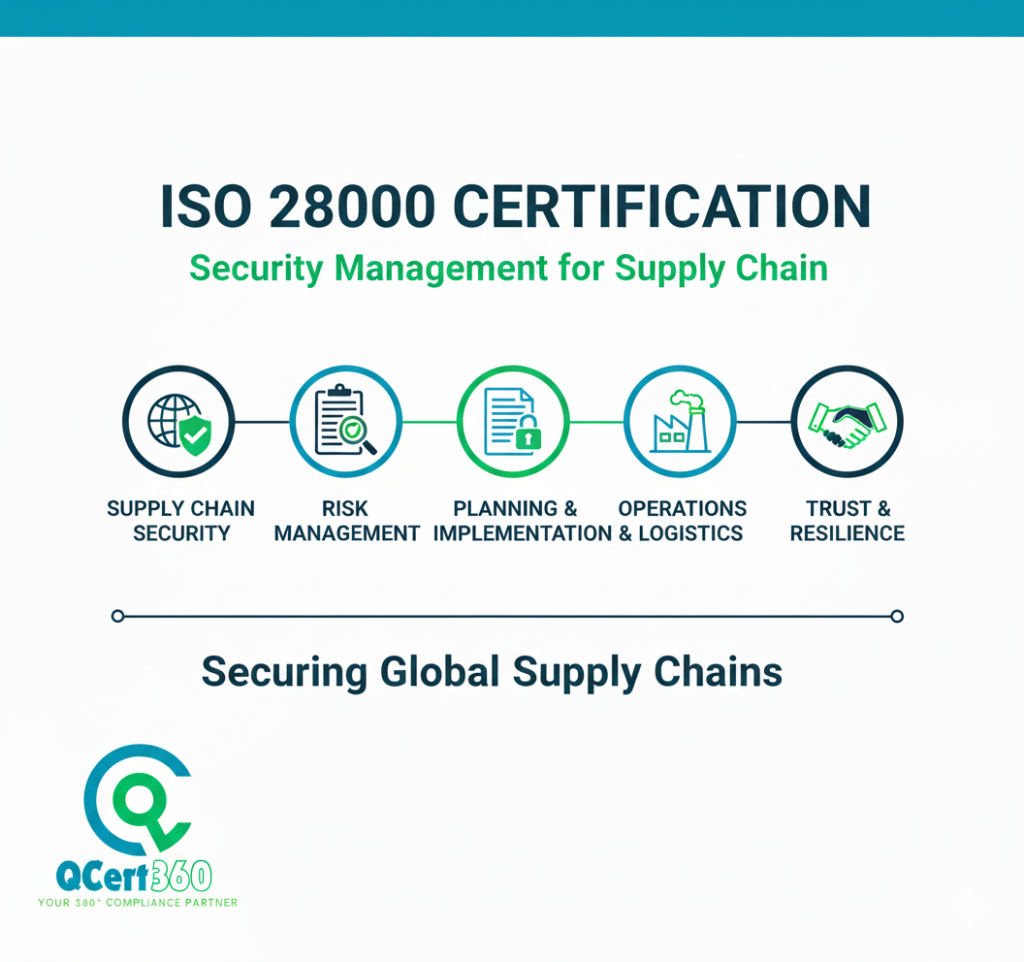ISO 28000:2022 Certification
ISO 28000 is the international standard for Security Management Systems in the supply chain. It provides a framework for organizations to assess risks, implement controls, and ensure the safety of goods, people, and infrastructure throughout logistics operations. The standard addresses threats such as theft, terrorism, smuggling, and piracy, while promoting resilience and continuity. ISO 28000 helps organizations strengthen security practices, reduce disruptions, and build trust with customers, regulators, and partners. Certification demonstrates a commitment to safeguarding supply chain operations, meeting regulatory requirements, and supporting global trade. It applies to all organizations involved in manufacturing, logistics, and transportation.
Request a Call Back
Get Free Consultation
Have any Questions?
Mail us Today!
contact@qcert360.com
ISO 28000 Certification – Securing Supply Chain Operations
Global trade and interconnected logistics bring both opportunities and risks. From piracy and theft to cyber threats and regulatory challenges, supply chains face increasing vulnerabilities that can disrupt business continuity. ISO 28000 certification provides an internationally recognized framework for supply chain security management, helping organizations minimize risks, protect assets, and maintain reliable operations across borders.
What is ISO 28000 certification?
ISO 28000 is an international standard that specifies requirements for a Supply Chain Security Management System (SCSMS). It provides organizations with a structured approach to identifying, managing, and mitigating security risks in all aspects of the supply chain, from transportation and warehousing to customs compliance and digital data exchange.
The standard applies to companies of all sizes and sectors that rely on supply chains, ensuring stronger resilience, risk preparedness, and operational efficiency while meeting global trade and security regulations.
Why ISO 28000 Matters for business accross the globe
In an interconnected global economy, even minor supply chain disruptions can ripple across industries, causing financial losses, reputational damage, and regulatory scrutiny. ISO 28000 certification provides organizations with a structured framework to anticipate, prepare for, and respond to these challenges effectively. It ensures that supply chains remain secure, resilient, and trusted by stakeholders. Key reasons why ISO 28000 matters include:
Risk management – Proactively identifies, assesses, and mitigates potential threats such as theft, piracy, terrorism, or cyber-attacks across the supply chain.
Regulatory compliance – Ensures alignment with global security programs like C-TPAT and WCO SAFE, reducing delays and penalties.
Operational continuity – Maintains uninterrupted logistics and delivery processes even during crises or unexpected disruptions.
Stakeholder confidence – Enhances credibility with customers, partners, regulators, and insurers by demonstrating robust security practices.
Competitive advantage – Positions the organization as a trusted partner in international trade, improving access to contracts and global markets.

Benefits:
Enhanced Marketability:
Obtaining certification boosts brand visibility and credibility, making products and services more attractive to consumers and increasing market share in global markets.
Consumer Trust & Satisfaction:
Certification assure customers of consistent quality, safety, and reliability, fostering trust, increasing brand loyalty, and ensuring higher levels of customer satisfaction.
Regulatory Compliance
Certification ensure compliance with global standards and regulations, helping businesses avoid legal issues, penalties, and enabling smoother entry into diverse international markets.
Competitive Advantage
Holding certification distinguishes a business from competitors, signaling superior quality and reliability, and positioning the company as an industry leader in the market.
Global Expansion
Certification provide access to new international markets, demonstrating that a business meets global standards, which facilitates expansion and opens doors to new business opportunities worldwide.
Risk Mitigation & Efficiency
Certifications help identify and mitigate risks, streamline operations, and reduce errors or defects, ensuring efficiency and consistency while safeguarding against operational disruptions.
Core Components of ISO 28000 certification standard
ISO 28000 is built around a risk-based management framework that drives continuous improvement in supply chain security. The standard ensures organizations take a structured, proactive approach to minimizing risks. Core components include:
Leadership and Commitment – Senior management plays a central role by setting clear security objectives, providing resources, and embedding supply chain security into corporate strategy.
Risk Assessment and Planning – Organizations systematically identify, evaluate, and prioritize potential threats such as theft, terrorism, or cyber-attacks to prepare effective mitigation plans.
Security Controls Implementation – Companies establish physical barriers, IT protections, and process-driven safeguards to secure transportation, storage, and distribution.
Operational Control – Secure handling of goods during shipping, warehousing, and transit ensures minimal vulnerabilities across supply chain nodes.
Emergency Preparedness and Response – Well-defined protocols enable rapid response to disruptions, minimizing damage and restoring normal operations quickly.
Compliance Monitoring – Regular reviews, audits, and performance tracking verify that systems align with international security requirements and internal policies.
Continuous Improvement – Organizations refine and strengthen supply chain security practices to adapt to evolving risks, regulations, and market expectations.
Benefits of ISO 28000 Certification service
Organizations that achieve ISO 28000 certification gain strategic advantages that go beyond compliance. Key benefits include:
Enhanced Supply Chain Resilience – The framework reduces vulnerabilities, helping businesses withstand disruptions such as theft, piracy, cyberattacks, or geopolitical instability.
Stronger Compliance – Certification aligns operations with international security initiatives like C-TPAT and WCO SAFE, ensuring smooth cross-border trade.
Improved Efficiency – Standardized processes for risk identification, monitoring, and response minimize delays and optimize supply chain operations.
Increased Trust and Credibility – Regulators, clients, and business partners view certified organizations as reliable, security-conscious players in global trade.
Reduced Risks and Losses – By mitigating security threats, businesses avoid costly financial losses, reputational damage, and legal penalties.
Competitive Market Positioning – ISO 28000 demonstrates commitment to secure supply chain practices, opening doors to global contracts and partnerships.
Who Needs to get ISO 28000 Certification?
ISO 28000 is relevant to any organization directly or indirectly involved in supply chains, logistics, or trade. It provides a structured framework to manage risks, protect assets, and maintain continuity. Key industries that benefit include:
Logistics and Transport Companies – From shipping lines and trucking fleets to air cargo, these organizations face constant security challenges such as theft, smuggling, and cargo tampering. ISO 28000 helps ensure goods move safely and on time.
Manufacturers and Exporters – With products crossing multiple borders, certification safeguards against losses, delays, and compliance issues, giving exporters a competitive edge in global markets.
Retailers and Distributors – Ensures safe, reliable, and efficient delivery of products, protecting brand reputation while maintaining customer trust.
Ports, Airports, and Terminals – These high-traffic hubs are prime targets for security breaches. ISO 28000 establishes controls to protect infrastructure, people, and cargo.
Government and Customs Authorities – Certification strengthens national trade security, improves border controls, and aligns with global security frameworks like WCO SAFE.
Energy and Utility Providers – From oil pipelines to electricity supply, secure transportation and storage of critical resources is vital to prevent disruption.
In short, any organization dependent on secure, efficient, and compliant supply chains can achieve measurable benefits from ISO 28000 certification.
The Role of Continuous Improvement in ISO 28000 certification
A defining strength of ISO 28000 is its focus on continuous improvement in supply chain security. Certification is not a one-time exercise but an ongoing commitment to resilience. Organizations must regularly conduct risk assessments, review vulnerabilities, and refine controls to address both existing and emerging threats. This may include updating incident response plans, enhancing digital safeguards against cyber-attacks, or adapting logistics strategies to counter geopolitical disruptions. Regular monitoring and audits ensure that practices stay aligned with evolving international regulations and industry requirements. By embedding continuous improvement into daily operations, businesses can minimize risks, strengthen stakeholder trust, and maintain operational continuity. Ultimately, ISO 28000 creates a culture of vigilance and adaptability that supports long-term supply chain resilience.
Conclusion: How Qcert360 Can Help obtain ISO 28000 Certification for your company
ISO 28000 certification is not just about ticking compliance boxes—it’s about creating a secure, resilient, and future-ready supply chain. By adopting this framework, organizations can protect assets, ensure uninterrupted operations, and inspire greater confidence among customers, regulators, and business partners. It strengthens risk management, boosts efficiency, and provides a competitive edge in the global marketplace.
At Qcert360, we specialize in guiding businesses through every stage of the ISO 28000 certification journey. Our team supports you with detailed gap analysis, risk assessments, policy and process development, employee training, and audit preparation. We simplify complex requirements, making certification both achievable and effective. With Qcert360 as your partner, certification becomes more than compliance—it’s a strategic investment in securing your supply chain, improving market credibility, and driving long-term business resilience. Together, we help organizations achieve lasting trust, operational strength, and sustainable growth.
Sectors & Industries we serve
Our Services
ISO Standards
- ISO 9001 Certification
- ISO 14001 Certification
- ISO 45001 Certification
- ISO 22000 Certification
- ISO 17025 Certification
- ISO 27001 Certification
- ISO 13485 Certification
- ISO 20000-1 Certification
- ISO 41001 Certification
- ISO 22716 Certification
- ISO 50001 Certification
- ISO 22301 Certification
- ISO 29993 Certification
Product Certifications
Other international standards
- FSSC 22000 Certification
- HIPAA
- HACCP Certification
- SA 8000 Certification
- GMP Certification
- GDPR
- GDP Certification
- GLP Certification
- Certificate of Conformity


